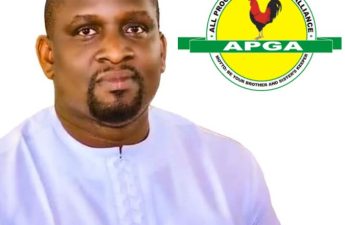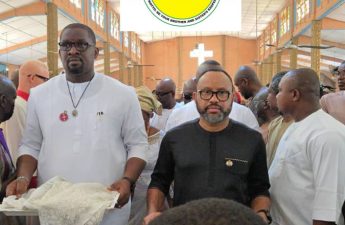This is written by Satire Saturday. Enjoy.
The festive season is here and so both human and vehicular movements on the major streets of old GRA axis in Ilorin, Kwara State, would not be the same again. For old women, young men, party stalwarts, hangers-on and other appendages of power, all roads lead to ‘Ile L’oke’––the Saraki family’s political headquarters located just a few metres away from the complex of the state-owned Radio Kwara.
It’s also at this period of the year that prospective political appointees and power brokers in the party would have their fate decided by the ‘almighty’ political god in Kwara, Bukola Saraki, widely christened ‘Leader’ by his disciples and other extended sycophants. When I lived in that neighbourhood, it was always a mixture of fun and pity watching people genuflect around to get the ‘leader’s’ attention whenever he came around.
Since 2011 that he emerged the new god in Kwara politics, that has been the tradition. Saraki has literally served as an alternative government towards whom the people run for political patronage and solution to their socio-economic needs.
The structure, however, just as it has been for decades in the case of his late father, is the parasitic type: the ‘Leader’ helps the people with handouts and earns in return, huge political capital with which he controls the power structure of the state and ultimately handpicks whomever he deems fit for leadership positions.
And with the strong support of the traditional institutions in the state––in collaboration with whom not a few Kwarans believe the people’s collective patrimony is shared––especially in Kwara Central, Bukola Saraki has literally decided the fate of all political aspirants in the state in the last seven years.
From House of Assembly aspirants through to those jostling for Senate positions all the way to grassroots party mobilisers and those seeking political appointments, being in the good book of the ‘Leader’ is the biggest criterion for enjoying visibility and patronage.
Many who do not understand how deep the sycophantic structure is wonder why it is so easy for Saraki to switch camp and, at the mere snap of fingers, have millions of his supporters come along with him. A visit to ‘Ile L’oke’––otherwise known as ‘Ile Arugbo’––whenever the ‘Leader’ is in town would provide better insight.
Now, to be fair, Bukola Saraki’s journey to that position was not without its acrimony. He would edge out his late father, Olusola Saraki, in the deeply rancorous 2011 general elections and install his favourite candidate and now incumbent governor, Abdulfatah Ahmed, of the Peoples’ Democratic Party, PDP, as governor. The move was against the wish of his late father who wanted and indeed supported Bukola’s sister, Gbemisola Saraki, as governorship candidate.
That successful move, more than anything else, cemented Bukola’s position as the ultimate power broker in Kwara politics and he has remained same ever since, perhaps until the recent bye-election tsunami in Kwara South which, frankly, threatens his legitimacy in Kwara politics. But again, whether that election would affect his politics is still a matter of political permutation and conjectures. For now, it is dicey and Bukola still enjoys his ‘leader’ship position in Kwara politics.
First, to the chagrin of a few Kwarans, the state and all symbols of official sovereignty surrender their legitimacy whenever the ‘Leader’ comes to town. At a point in his first term, a tale which may after all not be entirely apocryphal had it that the governor, Mr Ahmed, always ran to the Ilorin airport whenever feelers came in that the ‘leader’ was about to arrive Ilorin. Of course, at ‘Ile Loke’, without doubt the political Mecca of Kwara politicians, many have had their ambitions truncated just as others have had theirs revived, courtesy of the magisterial verdict of the ‘leader’.
But beyond politics, the hegemony of the Saraki dynasty in Kwara politics would have been fascinating if it translated to good governance and development for the common man. It has however been a different kettle of fish: infrastructure has been in shambles; pensioners are barely paid; workers, especially in local governments, have been starving; development is on stand still.
Of course, while it may be sound an argument to absolve the senate president of all blames having handed over power to the incumbent since 2011, a rigorous analysis of the power dynamics in the state would show otherwise. And it is in that context that SATIRE SATURDAY finds worrisome, the senate president’s declaration on December 2 that he would start “off setting salary arrears owed certain category of workers in Kwara state from next week.”
Daily Trust reported on December 2 that Saraki announced this during the PDP monthly stakeholders meeting at the ‘charity house’ in Ilorin, Kwara state, adding that he would commence the payment of salary arrears with three selected local government areas; one each from the three senatorial districts of the state. https://www.dailytrust.com.ng/saraki-promises-to-offset-kwara-workers-salary-arrears.html This column looked forward to a rebuttal by the Saraki media office but no one has come out to debunk the claim, suggesting he was not misquoted and indeed made the promise.
First, it wasn’t the first time such would happen to Kwara and it may not be the last. Earlier in May, the Senate President was reported to have offset the 20-month salary arrears owed some categories of traditional chiefs in Kwara central senatorial district. “Though, it’s the responsibility of local government councils to pay traditional chiefs’ salaries, the affected local government areas; Ilorin East, Ilorin South and Asa could not meet their financial obligations to the monarchs because of the drastic shortfalls in their allocation from the federation account,” Daily Trust reported. The 220 affected traditional chiefs received a total sum of N49,438,000.00, the paper added.
As tempting as it is to consider the move a positive one even for the most simple-minded of analysts, a deeper look would show something is fundamentally wrong with such situation where an individual assumes the responsibility of the state. Without doubt, it speaks to the emptiness of the sovereignty around which the state is built.
Then a more rigorous analysis shoots out the dark irony of the whole situation: that the man who now ‘rescues’ the state and takes over its statutory responsibility was alleged to have bled the state dry by receiving outrageous pensions and salary payments from the state’s meagre resources years after he vacated office as governor and was receiving huge entitlements as senator.
In fact, a witness, Michael Wetkas, claimed that Saraki received monthly salaries from June 2011, when he left office as governor of the state, to August 2015 when he served as a senator, in a clear case of outright illegality. https://www.thisdaylive.com/index.php/2016/04/07/witness-saraki-was-paid-salary-by-kwara-after-leaving-office/
Saraki’s case in Kwara isn’t an isolated case; it is but a reflection of the larger rot in which we have found ourselves as a people used as pawns in the hands of dealers masquerading as leaders. A few days to the last Osun gubernatorial election, APC leader Bola Tinubu had suggested in Oshogbo that Osun does not have his kind of money; money worthy of being stolen. Of course Tinubu was right: he governed Lagos, Nigeria’s richest state, for eight years and has decided every governor who occupied that position since 2007 after he left office. In the next couple of months, a man who has openly promised to “Sanwo e!” (“Pay his money!”) will hold sway.
What’s perhaps the difference between both men in this context is that Lagos is chubby and may not necessarily feel the effect of heavy bleeding quite easily; reason it hardly owes salaries despite the bleeding. Kwara, on the other hand, is poor and has been bled to coma by the asphyxiating influence of its ‘dealers’, reason it can hardly pay salaries.
But more importantly, SATIRE SATURDAY wonders why these states are still legal entities and are still independent of these ‘leaders’. Why can’t Bukola Saraki simply purchase Kwara state in its entirety and list it on the Nigerian and London stock markets?
Pray, since an individual like the senate president can offset salaries––even when the state in all its glory and grandeur cannot do same––why is it difficult to buy out Kwara state, with its assets and liabilities, register it the Corporate Affairs Commission (CAC) as a business entity, run it as a business concern and promptly pay salaries? Why own the state unofficially, put in the hands of salary-defaulting mangers and allow workers suffer?
With his ground-breaking experience at Societal Generale, SATIRE SATURDAY has no doubt about Mr Saraki’s managerial wizardry. Hence, in the interest of the Kwaran public and those hungry civil servants whose salaries would be paid regularly if the state officially becomes the senate president’s business concern, may we respectfully appeal to the ‘Leader’ and ask, with tears in our heart: when is Saraki going to buy out Kwara state?



